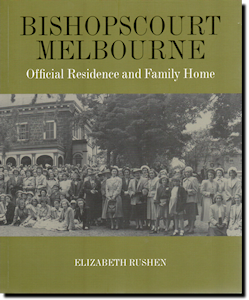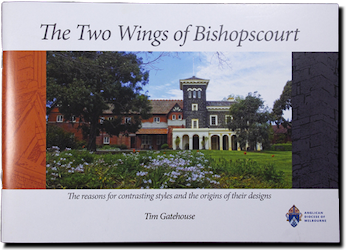Bishopscourt has featured in many publications since its completion in 1853. If you would like to learn more about the building and the people, you can consult the selected bibliography. Recent publications are available for purchase. Please contact Bishoposcourt for information.

James Grant
Australian Scholarly Publishing, Melbourne, 2010
A brief account of the history of Bishopscourt, including its original construction, later renovations, garden layout, its residents and social life. Includes quotations from contemporary sources and photos.

Elizabeth Rushen
Mosaic Press, Preston, 2013
A social history of Bishopscourt Melbourne. It starts with the arrival of Bishop Perry and his choosing of the site for Melbourne’s episcopal residence and works through the trials and tribulations that he and his wife experienced in the establishment of a house and a tradition that had to serve both their public and private lives. It continues through the lives of the thirteen subsequent incumbents and their families as played out in the house. The book also provides a detailed history of the house itself from first construction through the many alterations, major and minor. The history of the garden is woven into the larger story.

Tim Gatehouse
Anglican Diocese of Melbourne, Melbourne, 2017
An account of Charles Perry’s voyage to Port Phillip on ‘The Stag’. Charles Perry, first bishop of Melbourne, arrived in Melbourne in 1847, with his wife, Frances, and 80 other passengers including a number of clergymen hand-picked to assist him in his ministry. Author Tim Gatehouse has followed the story of journey out and the lives of some of the passengers on the ship.

Tim Gatehouse
Anglican Diocese of Melbourne, Melbourne, 2017
The question most commonly asked by visitors to Bishopscourt is the reason the two wings are built in such distinctly contrasting styles. Both wings have acquired reputations at wide variance from each other, neither being wholly deserved. The bluestone, or Blackburn wing, is generally regarded as a work of architectural perfection, while opinions of the red brick, or Butler wing, vary from it being dull to abominable. This book provides the answer.
